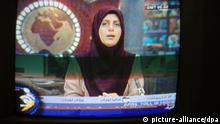Programming from the Deutsche Welle and other foreign broadcasters has
been jammed in parts of the Middle East. DW Director General Erik
Betterman called the interruption an attack on freedom of the press.
Western radio and television broadcasts to parts of the Middle East have
apparently been cut off because of a targeted jamming attack. In
addition to programming by Deutsche Welle, the BBC and Voice of America
have also been affected.
European satellite operator Eutelsat said earlier this week that the
"deliberate and intermittent interference" originated in Syria.
Deutsche Welle programming was last interrupted on Thursday morning
(18.10.2012). DW Director General Erik Bettermann protested against the
renewed attack on freedom of expression. In cooperation with other
foreign broadcasters, the Deutsche Welle was preparing a resolution
against the jamming, Bettermann said.
Experts suspected that Iran was behind the current interruptions.
According to media reports, the country has jammed reception of a
variety of broadcasters in recent years.
The most recent episode, experts said, could be connected to a Eutelsat
decision to stop carrying 19 Iranian channels. The satellite operator on
Monday stopped broadcasting television and radio stations operated by
Iran's state media organization, Islamic Republic of Iran Broadcasting
(IRIB). Effective immediately, the programming offered by these
channels, including the international news channel "Press TV," is no
longer available outside of Iran.
Eutelsat has stopped broadcasting television and radio stations operated
by Iran's state media organization, Islamic Republic of Iran
Broadcasting (IRIB). Effective immediately, the programming offered by
these channels is no longer available outside of Iran. Among the 19
stations affected by the decision is the international news channel,
Press TV.
The European satellite operator justified its actions by referring to a
March decision by the Council of the European Union, when EU leaders
placed IRIB head Ezzatollah Zarghami on its list of sanctioned persons.
Eutelsat, which is based in France, also cited a request by the French
broadcasting authority to shut down IRIB channel Sahar 1 TV.
Iran considers legal action
 IRIB head Zarghami, left, is on the EU's list of sanctioned persons
IRIB head Zarghami, left, is on the EU's list of sanctioned persons
Iran has protested the decision, calling it an attempt "to prevent a
dissenting voice to the broadcasting of Western thinking." Speaking with
DW, the Iranian embassy in Berlin said Eutelsat's actions were illegal
and a clear violation of press freedoms and freedom of expression. "The
Islamist Republic reserves the right to take legal action against these
measures," said a spokesperson.
Anja Zimmer, head of the German Federation of Journalists (DJV) in North
Rhine-Westphalia, was also critical of Eutelsat's decision. "Regardless
of this case, a broadcaster should not be prevented from airing its
programming," she said. "A satellite operator should, on principle, not
censor its content."
Censorship and show trials
It's somewhat of a surprise that the Iranian regime chose to use the
"freedom of expression" argument to make its case. This is the same
country that ranked near the bottom of the latest press freedom index
published annually by Reporters Without Borders. Iran was ranked 175th
of 179 countries.
"I don't find it terribly convincing that a country that so obviously
tramples press freedoms is now so enraged," said Zimmer. "After all, the
information broadcast to the public by Iranian state radio is rather
more filtered than free, to put it mildly. That this country would now
dare to bring up the issue of press freedom is surprising."
IRIB also didn't balk at showing forced confessions and show trails in
August 2009 and December 2011, clear violations of international law
that resulted in the EU Council's decision to sanction IRIB head
Zarghami.
 Iran has ranked poorly on the press freedom index
Iran has ranked poorly on the press freedom index
The Iranian regime and Eutelsat were involved in another conflict a few
weeks ago, when the satellite operator complained that Iran had been
disrupting the domestic transmissions from the Persian-language
offerings of Western broadcasters - an accusation that Tehran has
denied.


